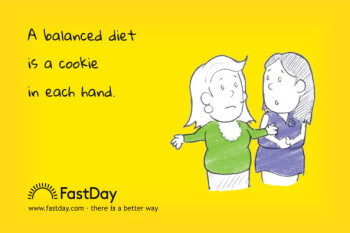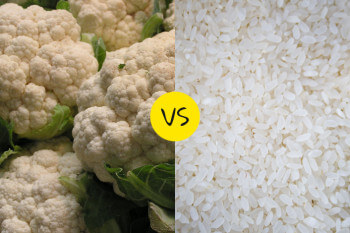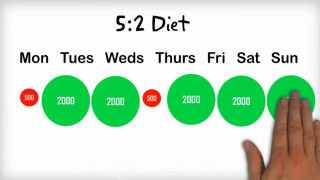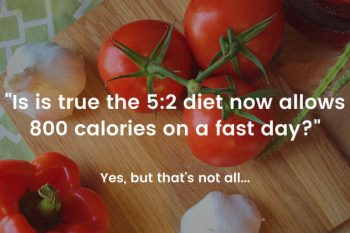Mistake #1 Thinking that “Eat whatever you like” means “eat however much you like”!
This is something we see time and again here at FastDay as well as on other fasting community sites and articles. So many people seem to misunderstand the idea of eating as normal on their feed days. Put simply “eat what you like” means that no foods are forbidden, it does not mean you can eat as much as you want of anything and everything and still expect to lose weight. The basic way 5:2 works in terms of weight loss is to reduce your calorie intake over the course of the week (while the time spent without food has a greater impact on general health than on the weight loss itself, it does play a role) and thereby cause you to lose weight. If you were to consistently over eat on your feed days you would negate this calorie deficit and either maintain or gain weight. So, while the original documentary and book may say you can ‘eat as normal’ or ‘eat what you like’ some clarification is required it seems to explain that ‘normal’ means eating to TDEE (total daily energy expenditure) and ‘eat what you like’ means that unlike other diets there are no forbidden foods, as long as they fall within your calorie needs.
Find out more about eating on your feed days
Mistake #2 Counting calories incorrectly
Another common mistake and unfortunately this has been the undoing of many a fast! Please do be sure to read the labels on your food carefully. Not only is it easy to make a mistake when it comes to calories per serving, but also in terms of cooked vs uncooked quantities of a product. As a rule of thumb always ask yourself, “Does this sound too good to be true?” and if you answer “yes” then it probably is – re-read that label and double check to be sure! Does that pizza say it is only 500 calories? Is that really for the whole pizza, or is it per serving? How many servings does it suggest are in the packet? And those dry ingredients like rice, pasta, noodles (yes, I know carbs aren’t ideal on a fast day, but we all do this in a way which works for us personally and if that means carbs for some then who are we to argue?) are notorious for their confusing calorie counts – do check whether the calories listed by weight are for a dry, pre-cooked portion or for a cooked serving. Instant noodles seem to be a common slip-up on this front, where not only are the calories often listed by dry weight but also often only state the calories for half a packet (who really eats just half a pack of instant noodles?). Where possible I always base my calories on raw/dry weight and measure everything out before I cook it! It’s all too easy to go wrong here and realise that your 500 calorie meal was actually nearer 1000 calories and the fast was not really a full fast.
Browse our collection of calorie counted recipes for your fast days
Mistake #3 Considering a fast a ‘fail’ unnecessarily
With the above in mind, yes there are some times where a fast isn’t strictly speaking a fast day, even if it was rather lower calorie than a feed day. But, all too often I see fasters fretting about having gone just a few calories over and asking if it should be considered a fail and that they should fast again tomorrow to make amends. If this is you, please relax! A few calories over isn’t going to ruin the fast. 500/600 isn’t some magical number through which weight is lost, it is simply based around 25% of the average calorific needs for an adult. Personally I’ve had times where I fasted on nearer 600 calories or even 700. Will it reduce the weight loss? Well, slightly. Will you lose the benefits of fasting? It depends on how long you’re going without food I suppose. But, there’s no need to consider it a failure if you go a bit over! This is the attitude of traditional diets creeping in! We’ll have none of that here thank you! Intermittent fasting is a way of eating for life. So, a fast went wrong. Big deal. You had to change your days? No problem. You only managed one fast this week? It doesn’t matter. It’s one fast out of a lifetime. Learn from your mistakes, don’t beat yourself up and just keep on. It’s not like with typical diets where one bad day can make you feel you’ve failed and fall off the wagon. This method is flexible. It works around you, giving you back the control. Just don’t make a habit of going vastly over your calories each fast if you can help it. Unless you’d like to consider doing ADF, which is based on a higher calorie allowance (but is a bit less flexible).
Find out more about different methods of intermittent fasting
Mistake #4 Eating back burned calories
Exercising on a fast day may not be everyone’s cup of tea, but for those of us who do (I do enjoy breaking a sweat on the exercise bike to pass the time and feel great!) it’s important to remember that the calories burned from exercise are not added to our calorie allowance for the day, despite what some health apps might tell us! It’s up to you if you choose to eat burned calories back on non fast days when you exercise, but on your fast days remember to stick to your fasting calorie allowance regardless of how much (or little!) activity you get up to. Consider any calories burned on those days a bonus!
Find out more about exercising on a fast day
Find out more about how exercise affects metabolism
Mistake #5 Breaking the fast too soon!
This one seems to be a misconception among a few newbies and they are usually quickly corrected. If you’re a new starter do bear this in mind so that you don’t get into a wrong habit from the start!
A fasting day looks like this: Sleep – Eat no more than 500/600 calories – Sleep – Eat as normal
The fast is not over when you’ve eaten your 500 calories. You don’t resume normal eating until the next day! I’ve seen people talking about staying up until midnight so they can eat something, well that’s not how it works. A fasting day is more like 36 hours than 24 because it contains a full night’s sleep either side of it. You won’t help your weight loss if you stay up late to eat extra calories on what is technically still your fast. You’re not going to die of starvation, don’t worry – and you probably won’t actually feel as hungry as you expect the following morning.
Find out more about getting to sleep on fast days
Find out more about what and when to eat on your fasting days
Can you think of any more common mistakes fasters might make? Let us know in the comments!














